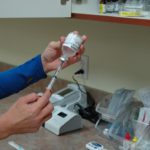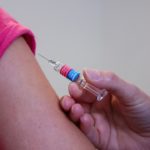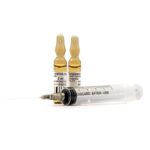
What is Chickenpox Vaccine? Chickenpox vaccine, also known as varicella vaccine, is a vaccine that protects against chickenpox. The active ingredient in Chickenpox vaccine is a live but weakened varicella-zoster virus. This specially weakened virus is called the Oka strain. Chickenpox is caused by the varicella zoster virus (VZV). Its most common symptom is an itchy rash all over the
Read More …

Hepatitis B vaccine protects against hepatitis B. It is administered as intramuscular injection. A baby who is born to a chronically infected mother has a 70%–90% chance of being infected at birth. Many people who are chronically infected will suffer from serious problems such as cirrhosis (scarring of the liver) or liver cancer.

Genital human papillomavirus (HPV) is the most common sexually transmitted virus. Most HPV infections don’t cause any symptoms, and go away on their own. But HPV is important mainly because it can cause cervical cancer in women. More than 50% of sexually active men and women are infected with HPV at some time in their lives.

Rabies vaccines induce an active immune response that includes the production of neutralizing antibodies. This antibody response requires approximately 7–10 days to develop and usually persists for greater or equal to 2 years.

DPT vaccine protects against diphtheria, pertussis and tetanus. Diphtheria, tetanus, and pertussis are serious diseases caused by bacteria.

MMR vaccine is used to help prevent serious, sometimes fatal, infections caused by 3 viruses: measles (also known as rubeola), mumps, and rubella (also known as German measles).

BCG (Bacillus Calmette and Guerin) vaccine provides immunity or protection against tuberculosis (TB). This vaccine should be given soon after the child is born.

What is Polio vaccine? Polio is caused by a virus that lives in the throat and intestinal tract. It is spread mainly through contact with the faeces of an infected person (for instance, by changing diapers). Some children who get polio don’t feel ill at all. Others have the symptoms of a common cold, sometimes accompanied by pain and stiffness
Read More …
Rotavirus is recognized as the most common cause of severe gastroenteritis in infants and young children. The virus enters the body through the mouth. Rotaviruses are shed in high concentration in the stool of infected persons.
Pediatric Influenza – Symptoms – Fever, chills, runny nose, headache, Sore muscles, body aches, Diarrhoea and vomiting, Dry cough. Pediatric Influenza – Causes – It is caused by one of the three types of influenza viruses that is Type A, B, C..
 What is Chickenpox Vaccine? Chickenpox vaccine, also known as varicella vaccine, is a vaccine that protects against chickenpox. The active ingredient in Chickenpox vaccine is a live but weakened varicella-zoster virus. This specially weakened virus is called the Oka strain. Chickenpox is caused by the varicella zoster virus (VZV). Its most common symptom is an itchy rash all over the Read More …
What is Chickenpox Vaccine? Chickenpox vaccine, also known as varicella vaccine, is a vaccine that protects against chickenpox. The active ingredient in Chickenpox vaccine is a live but weakened varicella-zoster virus. This specially weakened virus is called the Oka strain. Chickenpox is caused by the varicella zoster virus (VZV). Its most common symptom is an itchy rash all over the Read More …
 What is Chickenpox Vaccine? Chickenpox vaccine, also known as varicella vaccine, is a vaccine that protects against chickenpox. The active ingredient in Chickenpox vaccine is a live but weakened varicella-zoster virus. This specially weakened virus is called the Oka strain. Chickenpox is caused by the varicella zoster virus (VZV). Its most common symptom is an itchy rash all over the Read More …
What is Chickenpox Vaccine? Chickenpox vaccine, also known as varicella vaccine, is a vaccine that protects against chickenpox. The active ingredient in Chickenpox vaccine is a live but weakened varicella-zoster virus. This specially weakened virus is called the Oka strain. Chickenpox is caused by the varicella zoster virus (VZV). Its most common symptom is an itchy rash all over the Read More …
 Hepatitis B vaccine protects against hepatitis B. It is administered as intramuscular injection. A baby who is born to a chronically infected mother has a 70%–90% chance of being infected at birth. Many people who are chronically infected will suffer from serious problems such as cirrhosis (scarring of the liver) or liver cancer.
Hepatitis B vaccine protects against hepatitis B. It is administered as intramuscular injection. A baby who is born to a chronically infected mother has a 70%–90% chance of being infected at birth. Many people who are chronically infected will suffer from serious problems such as cirrhosis (scarring of the liver) or liver cancer.
 Genital human papillomavirus (HPV) is the most common sexually transmitted virus. Most HPV infections don’t cause any symptoms, and go away on their own. But HPV is important mainly because it can cause cervical cancer in women. More than 50% of sexually active men and women are infected with HPV at some time in their lives.
Genital human papillomavirus (HPV) is the most common sexually transmitted virus. Most HPV infections don’t cause any symptoms, and go away on their own. But HPV is important mainly because it can cause cervical cancer in women. More than 50% of sexually active men and women are infected with HPV at some time in their lives.
 Rabies vaccines induce an active immune response that includes the production of neutralizing antibodies. This antibody response requires approximately 7–10 days to develop and usually persists for greater or equal to 2 years.
Rabies vaccines induce an active immune response that includes the production of neutralizing antibodies. This antibody response requires approximately 7–10 days to develop and usually persists for greater or equal to 2 years.
 DPT vaccine protects against diphtheria, pertussis and tetanus. Diphtheria, tetanus, and pertussis are serious diseases caused by bacteria.
DPT vaccine protects against diphtheria, pertussis and tetanus. Diphtheria, tetanus, and pertussis are serious diseases caused by bacteria.
 MMR vaccine is used to help prevent serious, sometimes fatal, infections caused by 3 viruses: measles (also known as rubeola), mumps, and rubella (also known as German measles).
MMR vaccine is used to help prevent serious, sometimes fatal, infections caused by 3 viruses: measles (also known as rubeola), mumps, and rubella (also known as German measles).